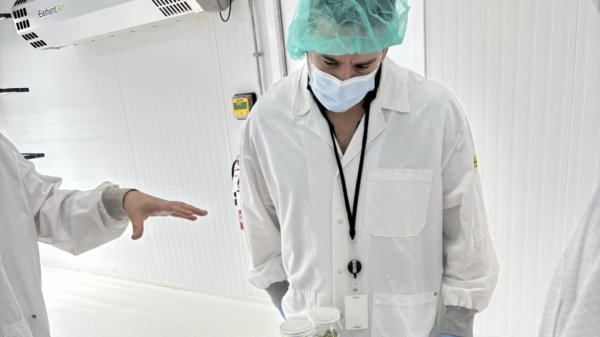Despite holding one of the richest cash positions in the Canadian cannabis industry, Cronos Group Inc. (NASDAQ and TSX: CRON) continues to disappoint investors with weak quarterly revenues, steep losses and impairment charges.
The Ontario producer reported Thursday a US$107 million net loss for the second quarter ending June 30, on net revenues of US$9.9 million.
Shares of Cronos have fallen almost 20 per cent since Thursday morning, and have dropped 75 per cent since Marlboro cigarette maker Altria invested $2.4 billion in the company in March 2019.
CEO Mike Gorenstein preached patience on a Thursday morning earnings call with analysts, as the company remains focused on its long term strategy amid “unprecedented shifts” in the legal weed sector and global economy.
“During these extraordinary times, it is very encouraging to see that we are making progress against our strategy across our global footprint,” Gorenstein said.
While the company saw the Covid-19 pandemic derail its U.S. CBD strategy, and continues to deal with low Canadian weed sales and a myriad of lawsuits, Gorenstein says the future remains bright as Cronos expands into the Israeli market and focuses on developing rare cannabinoids for commercialization.
In the quarter, Cronos took a US$40 million impairment charge related to a revaluation of its U.S. CBD brand Lord Jones and a US$35.9 million non-cash charge related to Altria’s investment.

Cronos Group’s Lord Jones luxury U.S. CBD brand is sold in high end beauty retailers like Sephora. Press photo
Reported sales from Lord Jones remained flat at US$2.2 million in Q2 after falling 20 per cent in the previous quarter.
Cronos said at the start of the year they were excited to expand their CBD business in the U.S. but the coronavirus has continued to keep many brick-and-mortar stores closed since mid-March, hampering sales and demand in the process.
CFO Jerry Barbato told analysts with a second wave of shutdowns looming and decreased foot traffic in some stores that have reopened, it’s hard to predict what the rest of 2020 holds.
Analyst Seth Rubin with CIBC asked executives how they are adapting to the new normal.
“Are there some signs you can offset the loss in brick-and-mortar sales through online channels, either through direct-to-consumer or online retailers?”
Gorenstein said the company has responded with a marketing blitz, new bulk sized products and steep discounts offered directly to online consumers to makeup for lost sales with its 900 retail partners.
Lord Jones CEO Robert Rosenheck stepped down last month and Cronos assigned former Altria executive Summer Frein as general manager of the CBD business. The company said it’s hopeful the U.S. federal government will establish regulatory clarity for the CBD space, which will help Lord Jones develop new products.
“We feel confident in the plans that business has to correct the trajectory of that business, and are very excited to see what summer will do to lead the business forward,” the chief executive said.
Read more: Cronos continues to underwhelm in Q1, warns Covid-19 will hamper sales
Read more: FDA issues cannabis research guidelines as CBD industry still hangs in limbo
Pending litigation, low market share on the home front
In Canada, Cronos recorded US$7.7 million in net revenue, compared to US$6.1 million in the previous quarter.
The company said the increase in adult-use sales was mainly driven by the launch of cannabis vaporizers in the Canadian market under its Cove and Spinach brands.
But compared to its peers with a market valuation north of $1 billion, Cronos continues to capture only a sliver of the market share on home soil.
Because of this, analyst Matt Bottomley with Canaccord Genuity asked if the company is focused on brand building or offering bulk value products like many large weed firms are now doing.
“I believe that building a brand off of essentially flower — which is commoditized — and, given the restrictions and regulations in Canada, will be difficult.” Gorenstein said.
Instead of competing with industry giants in the bulk value category, Gorenstein said Cronos is focused on developing innovative cannabis 2.0 products to help differentiate the company.
Read more: Corporate cannabis continues value brand pivot as Canada enters recession
The company reported a US$3.1 million writedown on dried cannabis inventory, driven by price compression in the Canadian market.
And with producers competing hard in the bulk segment and outdoor production coming online in a couple months, Cronos warned that pricing pressure will continue domestically — further hurting margins in the process.
Gross margin in the second quarter was a reported negative 30 per cent, helping push the company’s operating loss to US$34.8 million.
An increased head count and high general and administration costs of US$18.4 million hurt the firm’s bottom line, which Cronos said was further exacerbated by responding to a U.S. Securities and Exchange Commission investigation.
After the company allegedly double counted sales in three quarters of fiscal 2019, Cronos said it had to spend US$3.5 million in Q2, and US$4 million in Q1, to review the accounting errors.
Cronos $CRON spent almost $8 million to fix those botched 2019 financials that were goosing their revenues that caused an SEC investigation.
The craziest part? The amount they spent to fix the goosing was actually MORE than the fake revenue they had booked. #PotStocks pic.twitter.com/pGKTgOzuEA
— Betting Bruiser (@BettingBruiser) August 6, 2020
Making matters worse, Cronos said three class action lawsuits were filed against the firm in the quarter.
According to the company’s financial filings, the first statement of claim was filed June 3 in the Ontario Superior Court on behalf of shareholders for an undisclosed amount in response to the alleged double counting of sales.
The second statement of claim filed in an Alberta court June 16 represents a group of consumers seeking a total of $500 million from Canada’s larger licensed producers — including Cronos — for allegedly mislabelling cannabinoid contents on their products.
The third class action lawsuit was filed in a California court in April against Lord Jones’ parent company Redwood for breaking the state’s advertising laws. And while Cronos said the case was dismissed for certain pleading deficiencies, it expects “litigation and regulatory proceedings relating to the marketing, distribution and sale of our products to increase.”
Israeli market, rare cannabinoids and deep pockets keeps Cronos confident
Despite the rough quarter, Cronos says its massive cash pile allows it to focus on long-term investments in becoming a top-tier global cannabis company.
The company ended the quarter with approximately US$1.3 billion in cash and short-term investments.
“Given our strong balance sheet and decreased access to capital for industry competitors, we continue to feel that we are extremely well-positioned to be opportunistic in how we create value for shareholders,” Gorenstein said.
Like many peers, Cronos is focused on grabbing market share in Israel’s blooming medical cannabis market.
Read more: Aphria joins Israeli medical cannabis rush with new supply deal
The company said it made its first shipment of bulk dried flower into the country in June and its subsidiary Cronos Israel will continue to build distribution while it awaits final licensing for the sale of oils and pre-rolls.
Unlike other licensed producers who are just exporting product, Cronos says building a distribution network and a production facility inside Israel will pay off as the market expands.
While Israel has a population of just over 9 million people, Gorenstein said the country boasts one of the world’s highest cannabis usage rates and two adult-use legalization bills are progressing through parliament quicker than many had anticipated.
“And unlike the North American cannabis markets, Israel has a much less competitive illicit market, given Israel’s stringent border controls and security infrastructure,” he said.
In Latin America, the CEO said the company’s joint venture Natuera continues to make progress in Colombia, completing its first hemp harvest and test exports of CBD extracts to the U.S. for research and development purposes.
“Although this does not signify the start of revenue for this business, they provide good learnings that set us up well for the future.”
Another major part of the company’s strategy is its partnership with U.S. biotech firm Ginkgo BioWorks to develop rare cannabinoids.
Gorenstein said after successfully fermenting cannabigerol (CBG), the company’s subsidiary Cronos Fermentation remains on schedule to produce the rare cannibinoid for pharmaceutical applications at commercial scale in September 2021.
Gorenstein added the company continues to research other rare cannabinoids like THC-V and is bullish on the demand for new cannabis wellness products for the U.S. and global markets.
Top image via Deposit Photos
jared@mugglehead.com
@JaredGnam















